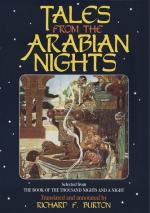[FN#107] In text “Natar” (watching) for “Nataf” (indigestion, disgust).
[FN#108] Here again we have the formula “Kala ’l-Rawi"=the reciter saith, showing the purpose of the Ms. See Terminal Essay, p. 144.
[FN#109] It were well to remind the reader that “Khalifah” (never written “Khalif”) is=a viceregent or vicar, i.e. of the Prophet of Allah, not of Allah himself, a sense which was especially deprecated by the Caliph Abubakr as “vicar” supposes l’absence du chef; or Dieu est present partout et a tout instant. Ibn Khal. ii. 496.
[FN#110] This tale, founded on popular belief in tribadism, has already been told in vol. vii. 130: in the W.M. Ms. it occupies 23 pages (pp. 95- 118). Scott (vi. 343) has “Mesroor retired and brought in Ali Ibn Munsoor Damuskkee, who related to the Caliph a foolish narrative (!) of two lovers of Bussorah, each of whom was coy when the other wished to be kind.” The respectable Britisher evidently cared not to “read between the lines.”
[FN#111] In pop. parlance “Let us be off.”
[FN#112] Arab. “Al-Afak” plur. of Ufk, “elegant” (as the grammarians say) for the world, the universe.
[FN#113] [In Ms. “Rankah” or “Ranakah,” probably for “Raunakah,” which usually means “troubled,”; speaking of water, but which, according to Schiaparelli’s Vocabulista, has also the meaning of “Raunak"=amenitas. As however “Ranakah” taken as fem. of “Ranak” shares with Raunakah the signification of “troubled,” it may perhaps also be a parallel form to the latter in the second sense.—St.]
[FN#114] The text has “Martabat Saltanah” (for Sultaniyah) which may mean a royal Divan. The “Martabah” is a mattress varying in size and thickness, stuffed with cotton and covered with cloths of various colours and the latter mostly original and admirable of figuration but now supplanted by the wretched printed calicoes of civilisation. It is placed upon the ground and garnished with cushions which are usually of length equally the width of the mattress and of a height measuring about half of that breadth. When the “Martabah” is placed upon its “Mastabah” (bench of masonry or timber) or upon its “Sarir” (a framework of “jarid” or midribs of the palm), it becomes the Diwan=divan.
[FN#115] In text “Bi-iza-huma;” lit. vis-a-vis to the twain.
[FN#116] These have occurred vol. i. 176: I quote Mr. Payne (i. 156).
[FN#117] In text “Hanna-kumu ’llah:” see “Hanian,” vol. ii. 5.
[FN#118] This is usually a sign of grief, a symbolic act which dates from the days of the Heb. patriarchs (Gen. xxxvii. 29-34); but here it is the mark of strong excitement. The hand is placed within the collar and a strong pull tears the light stuff all down the breast. Economical men do this in a way which makes darning easy.
[FN#119] [The Ms. is very indistinct in this place, but by supplying “’an” after “ghibta” and reading “’ayni” for “’anni,” I have no doubt the words are: Wa in ghibta ’an ’ayni fa-ma ghibta ’an kalbi=and if thou art absent from my eyes, yet thou are not absent from my heart. The metre is Tawil and the line has occurred elsewhere in The Nights.—St.]




